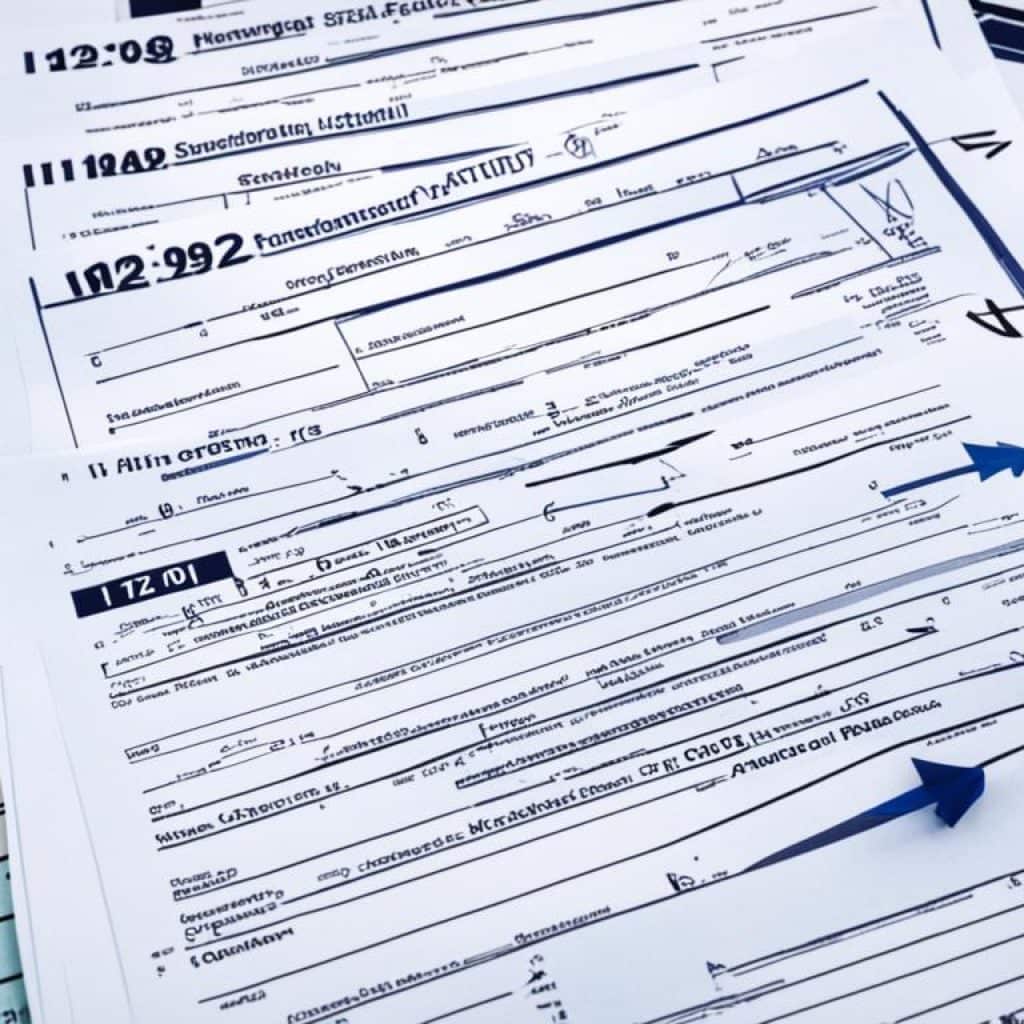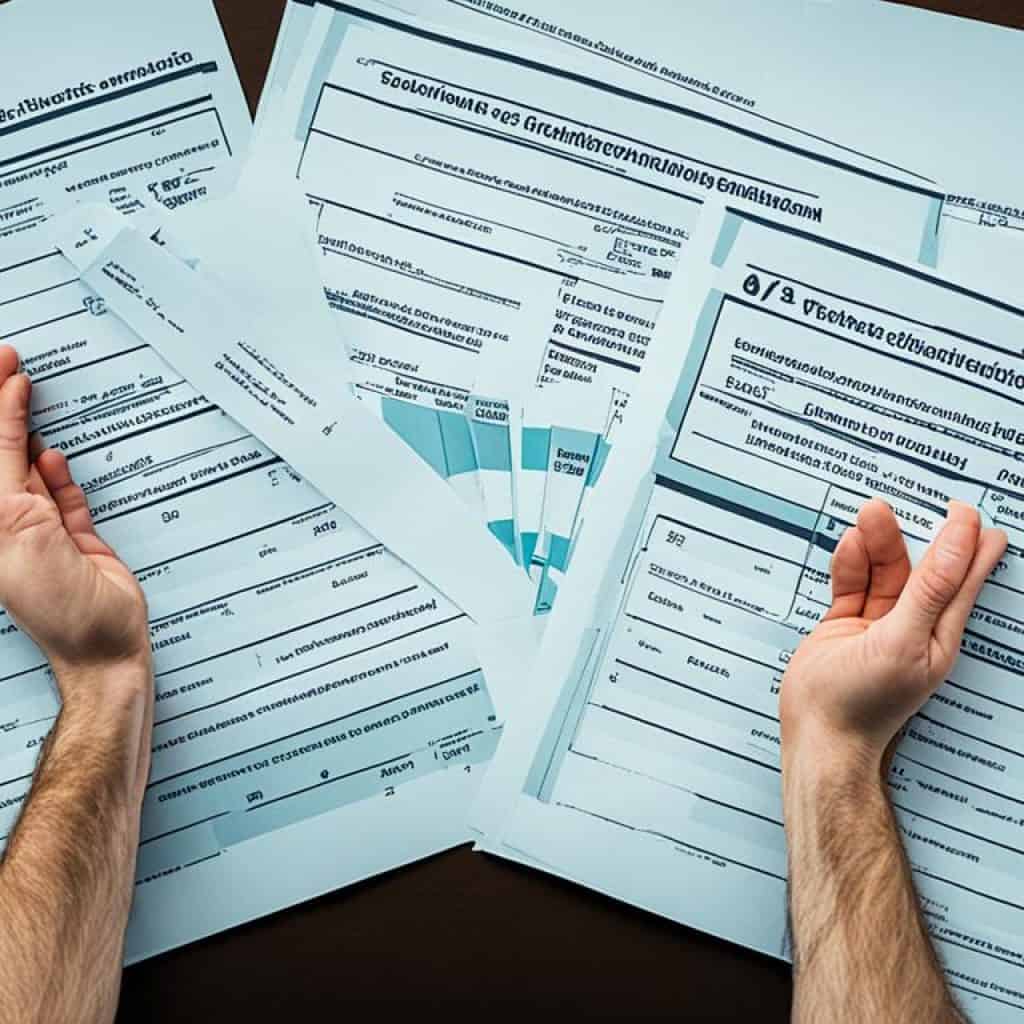Are you navigating the complex world of nonimmigrant stay extensions in the United States? Do you need to secure an approved I-129 for a smooth and efficient process? Understanding the requirements and steps involved is crucial for a successful outcome.
Applying for an approved I-129 can be a challenging process, but with the right knowledge and preparation, you can pave the way for a smooth journey. So, how can you ensure that your I-129 is approved and your stay in the United States is extended seamlessly? Let’s delve into the intricacies of the I-129 approval process and discover the key factors that can make all the difference.
- Understanding the requirements and steps involved in securing an approved I-129 is essential for a smooth process.
- Navigating the USCIS guidelines for nonimmigrant stay extensions can be complex, but with thorough preparation, you can increase your chances of success.
- Timely filing, providing all necessary supporting documents, and demonstrating continued eligibility are critical for I-129 approval.
- USCIS officers evaluate each case individually, and it is important to address any potential issues or concerns to avoid split decisions.
- Seeking advice from a qualified immigration attorney can provide valuable guidance throughout the I-129 approval process.
Understanding Nonimmigrant Stay Extensions
Nonimmigrant stay extensions are often necessary for individuals holding temporary nonimmigrant status, such as H-1B or H4 visas, who need to extend their authorized stay in the United States. To request an extension of stay, applicants must complete and submit the I-129 form to the United States Citizenship and Immigration Services (USCIS) along with all required supporting documents.
The I-129 form serves as the application for nonimmigrant workers, including individuals seeking to extend their stay in the United States. It is essential to familiarize yourself with the specific requirements and guidelines outlined by USCIS to ensure a successful application process.
The I-129 Form
The I-129 form is a crucial document for individuals applying for nonimmigrant stay extensions. It collects essential information and must be completed accurately to expedite the USCIS review process. Along with the form, applicants must submit supporting documents relevant to their visa category and demonstrate their eligibility for an extension of stay.
| I-129 Requirements: | Application Process: |
|---|---|
|
|
Diligently adhering to the requirements and instructions outlined in the I-129 form and USCIS guidelines significantly increases the chances of a smooth and successful application process. Remember to provide all necessary documentation and accurately complete the form to avoid unnecessary delays or potential rejection.
“Submitting a complete and well-documented I-129 application package is crucial for obtaining a nonimmigrant stay extension. Carefully review all requirements and guidelines provided by USCIS to ensure a successful outcome.”
Timely Filing and USCIS Discretion
When it comes to the I-129 petition, filing it on time is of utmost importance. The USCIS generally does not approve requests from individuals who have failed to maintain their previously accorded status or whose status expired before the application or petition filing date. However, USCIS has the discretion to excuse such failures under certain circumstances.
It is crucial to provide evidence of extraordinary circumstances beyond the individual’s control when filing the I-129 petition. This evidence can help support the request for an exception to the usual filing requirements. Additionally, it is important to ensure compliance with all filing requirements and fees as mandated by the USCIS.
“Filing the I-129 petition in a timely manner is the first step towards securing your approved petition. Providing evidence of extraordinary circumstances can increase your chances of receiving an exception from USCIS.”
By adhering to the proper timeline and supplying the necessary documentation, individuals can enhance their chances of getting their I-129 petition approved.

USCIS Approval Timeline for the I-129 Petition
Understanding the typical timeline for USCIS approval of the I-129 petition can be helpful for managing expectations. While the exact timeline may vary, it is important to consider the following factors:
- Case Processing Times: USCIS provides estimated case processing times for different types of petitions, including the I-129. These times may vary based on factors such as the USCIS workload and the complexity of the case.
- Request for Additional Evidence (RFE): If USCIS requires additional evidence to make a decision on the I-129 petition, it may issue an RFE. Responding to the RFE in a timely manner is crucial to avoid delays in the approval process.
- Adjudication Process: Once USCIS reviews the submitted I-129 petition and all supporting documents, they will make a decision on the approval. The time taken to reach a decision can vary depending on various factors.
It is important to note that USCIS aims to process cases as efficiently as possible. However, some complex cases or instances of high demand may result in extended processing times.
| Processing Stage | Average Timeline |
|---|---|
| Petition Submission | Approximately 1-3 months |
| Response to RFE (if applicable) | Approximately 2-3 months |
| Adjudication Process | Approximately 3-6 months |
| Total Approval Timeline | Approximately 6-12 months |
Extension of Petition Validity
When requesting an extension of petition validity, it is important to understand that USCIS does not automatically approve subsequent petitions based solely on prior approvals. USCIS officers evaluate each case individually and may consider deference to previous approvals, but only if certain criteria are met. It is crucial to provide evidence of continued eligibility and extraordinary abilities in the field.
Extension of petition validity depends on several factors, including:
- Evidence of ongoing employment or business activity in the United States.
- Continued eligibility for the nonimmigrant status for which the extension is being requested.
- Demonstration of extraordinary abilities or qualifications in the specific field.
USCIS officers carefully review the evidence provided in support of the extension request. This includes documentation such as employment contracts, performance reviews, awards, and recognition in the field. It is crucial to gather comprehensive and up-to-date evidence that showcases the individual’s continued exceptional abilities and contributions to the field.
Here is an example of the type of evidence that can be submitted:
| Evidence | Description |
|---|---|
| Published research papers and articles | Highlighting the individual’s contributions to the field |
| Patents or intellectual property | Showing the individual’s innovative work |
| Membership in professional organizations | Demonstrating recognition and involvement in the field |
| Affidavits from experts | Attesting to the individual’s exceptional abilities |
It is crucial to provide a clear and compelling narrative that connects the evidence to the individual’s outstanding abilities and continued eligibility for the requested extension. USCIS officers value well-documented and persuasive cases that meet the criteria for extension of petition validity.
Remember, each case is unique, and it is essential to consult with an experienced immigration attorney who can guide you through the process and help you present a strong and convincing case for the extension of petition validity.
Split Decisions in Extension Requests
When it comes to requesting an extension of stay, individuals may face split decisions from USCIS. In these cases, USCIS approves the petition for the same classification but denies the extension request. Factors such as inadmissibility or failure to maintain status can contribute to these split decisions.
To avoid these split decisions, it is crucial to address any potential issues and ensure compliance with all requirements. This includes maintaining status, providing accurate and complete documentation, and addressing any inadmissibility concerns. By addressing these factors proactively, individuals can increase their chances of a successful extension of stay request.
“It is important to address any potential issues and ensure compliance with all requirements to avoid these split decisions.”
Working with an experienced immigration attorney can also be beneficial in navigating the extension request process and identifying any potential issues that could lead to a split decision. An attorney can provide guidance, review documentation, and offer strategies to strengthen the extension request.
Ultimately, individuals seeking an extension of stay must demonstrate their eligibility and compliance with USCIS requirements. By thoroughly understanding the guidelines and addressing any potential issues, individuals can increase their chances of a successful extension request with USCIS.
Split Decisions in Extension Requests
| Factors | Description |
|---|---|
| Inadmissibility | Instances where individuals may be deemed inadmissible due to criminal history, immigration violations, medical issues, or other grounds. |
| Failure to Maintain Status | If an individual fails to maintain their previously accorded status or their status has expired before the application or petition filing date. |
| Documentation Errors | Any errors or omissions in the documentation provided can adversely affect the extension request outcome. |
| Incomplete Supporting Evidence | Failing to provide complete and sufficient evidence to support the extension request can negatively impact the decision. |
Remember, addressing potential issues and ensuring compliance with all requirements are essential to avoid split decisions in extension requests.

The O-1 Visa: An Overview
The O-1 Visa is a non-immigrant visa category that is specifically designed for individuals with extraordinary abilities in certain fields. It offers an opportunity for talented individuals to live and work temporarily in the United States.
There are two main categories of the O-1 Visa:
- O-1A Visa: This category is for individuals excelling in fields such as science, education, business, athletics, and more.
- O-1B Visa: This category is for those achieving extraordinary success in the motion picture or television industry.
To apply for an O-1 Visa, individuals will need to submit the I-129 form to the United States Citizenship and Immigration Services (USCIS). This form serves as a petition and must be accompanied by substantial evidence to demonstrate the applicant’s exceptional abilities and employment opportunities in the U.S.
Supporting evidence may include:
- Award certificates
- Publications
- Letters of recommendation
- Contracts
- Media coverage
It is crucial to provide comprehensive and compelling evidence to strengthen the case for an O-1 Visa approval.
Benefits of the O-1 Visa
The O-1 Visa offers various benefits to individuals with extraordinary abilities:
âThe O-1 Visa provides a gateway for highly talented individuals to pursue their careers, collaborate with top professionals, and contribute to the growth and development of their fields in the United States.â
| Benefits | Description |
|---|---|
| Extended stay | Allows up to three years initially, with the possibility of extensions |
| No cap | Not subject to annual numerical limitations like some other visa categories |
| Dependency | Allows spouses and children under the age of 21 to accompany the O-1 Visa holder as dependents |
| Flexibility | Enables O-1 Visa holders to engage in multiple projects and employers within their field of expertise |
Requirements for the O-1A Visa
To qualify for the O-1A Visa, individuals must meet specific requirements outlined by USCIS. These requirements include:
- Evidence of employment, such as employment contracts.
- Meeting at least three of the following criteria:
| Criteria | Description |
|---|---|
| Nationally or internationally recognized prizes or awards | Providing evidence of prestigious awards or prizes that recognize the individual’s exceptional achievements. |
| Membership in associations related to the field | Showing active participation and membership in professional associations or organizations related to the individual’s field. |
| Published material about the individual’s work | Demonstrating media coverage, articles, or publications that highlight the individual’s outstanding contribution to their field. |
| Original contributions in the field | Presenting evidence of significant contributions or innovations made by the individual in their specific area of expertise. |
Meeting these requirements is essential to establish the extraordinary ability and eligibility for the O-1A Visa. By providing evidence of employment and meeting the specified criteria, individuals can enhance their chances of obtaining this prestigious visa.

The O-1 Visa Application Process
The O-1 Visa application process consists of two stages. Understanding these stages will help you navigate the process smoothly and successfully obtain your O-1 Visa.
Stage 1: Submitting the I-129 Form
The first stage involves submitting the I-129 form along with supporting evidence to the United States Citizenship and Immigration Services (USCIS). This form serves as a petition for nonimmigrant workers with extraordinary abilities, including those in fields such as science, education, athletics, and the arts.
When completing the I-129 form, make sure to provide accurate and detailed information about your qualifications, achievements, and the purpose of your visit to the United States. Include the necessary supporting documents as evidence of your extraordinary abilities and employment in your field.
Stage 2: Visa Interview and DS-160 Form
During the visa interview, an officer will review your application and ask questions to assess your eligibility for the O-1 Visa. Be prepared to provide further documentation to support your extraordinary abilities and demonstrate your intent to return to your home country after your stay in the United States. In some cases, the visa interview may be waived, but it is always advisable to be prepared.
By following the O-1 Visa application process and providing the necessary documentation and information, you can increase your chances of a successful application and secure your O-1 Visa, allowing you to pursue your professional aspirations in the United States.
Tips for a Smooth O-1 Visa Interview Process
The O-1 Visa interview process can be nerve-wracking, but proper preparation can help ensure a smooth experience. Here are some essential tips to help you ace your O-1 Visa interview:
- Gather all necessary documentary evidence: Before your interview, make sure you have all the required documents neatly organized and readily accessible. This may include your passport, visa application confirmation, I-129 petition approval notice, supporting evidence of your extraordinary abilities, employment contracts, and any other relevant documents. Presenting a complete and well-organized set of documents will leave a positive impression on the interviewing officer.
- Know your case and field of expertise thoroughly: Familiarize yourself with the details of your case, including your accomplishments, professional achievements, and the significance of your work in your field. This knowledge will demonstrate your expertise and passion, making you more credible during the interview process.
- Practice potential interview questions: Take the time to practice answering potential interview questions. Research and anticipate the kind of questions you may be asked, such as the nature of your work, your contributions to the field, and your future plans in the United States. Practice your responses to ensure clarity, conciseness, and confidence.
- Dress professionally: Dress appropriately for your visa interview. Choose professional attire that reflects your serious intent and respect for the process. Dressing professionally will help create a positive first impression.
- Be presentable: Pay attention to your body language and demeanor during the interview. Maintain good eye contact, sit up straight, and project confidence. Be polite, respectful, and attentive to the interviewing officer.
Remember, the key to a successful O-1 Visa interview is thorough preparation and confident presentation. Follow these tips, and you’ll boost your chances of a smooth and successful interview process.
| Tips for a Smooth O-1 Visa Interview Process |
|---|
| Gather all necessary documentary evidence |
| Know your case and field of expertise thoroughly |
| Practice potential interview questions |
| Dress professionally |
| Be presentable |
Common Interview Questions for the O-1 Visa
During the O-1 Visa interview, applicants can expect to be asked a series of questions to assess their eligibility and genuine intent to visit the United States. It is crucial to prepare well in advance and familiarize yourself with the common interview questions to ensure a confident and successful interview experience. Below are some of the most common interview questions for the O-1 Visa:
- 1. What is the purpose of your visit to the United States?
Provide a clear and concise response highlighting the specific reason for your visit, such as attending a conference, collaborating with professionals in your field, or participating in a specific project or event.
- 2. What are your qualifications and achievements in your field?
Emphasize your exceptional skills, expertise, and accomplishments that set you apart from others in your field. Provide specific examples of awards, recognition, publications, or contributions that demonstrate your extraordinary abilities.
- 3. Can you describe the nature of your work or project?
Clearly explain the scope and significance of your work or project, highlighting its relevance and impact in your field. Provide specific details about the tasks, responsibilities, and objectives you will be engaged in during your stay in the United States.
- 4. What are your plans after your stay in the United States?
- 5. What ties do you have to your home country?
- 6. Can you provide your immigration history?
Preparing thoughtful, concise, and detailed answers to these questions will help you communicate your eligibility and genuine intent convincingly during the O-1 Visa interview. It is essential to practice your responses, considering the relevance and specific details of your own situation, to ensure a confident and successful interview experience.
| Common Interview Questions for the O-1 Visa | Sample Answer |
|---|---|
| 1. What is the purpose of your visit to the United States? | My purpose is to collaborate with renowned experts in my field and conduct groundbreaking research that will contribute to advancements in scientific knowledge. |
| 2. What are your qualifications and achievements in your field? | Throughout my career, I have received numerous awards, including the prestigious Nobel Prize, published groundbreaking research papers, and made significant contributions to the field of quantum physics. |
| 3. Can you describe the nature of your work or project? | I will be leading a research team focused on developing innovative cancer treatment methods using gene editing technology. Our project aims to revolutionize cancer therapy and improve patient outcomes. |
| 4. What are your plans after your stay in the United States? | After my stay in the United States, I plan to return to my home country and utilize the knowledge and expertise gained during my time here to establish a state-of-the-art research facility dedicated to advancing medical science. |
| 5. What ties do you have to your home country? | I have strong ties to my home country, including my family, ownership of properties, and collaborations with local institutions. These ties demonstrate my commitment to the growth and development of my home country’s scientific community. |
| 6. Can you provide your immigration history? | I have previously visited the United States on an O-1 Visa, adhering to all immigration regulations. I have always complied with the terms of my visas and maintained a clean immigration history. |
Conclusion
Navigating the I-129 approval process and the O-1 Visa application process can be complex, but with proper understanding of the requirements and thorough preparation, individuals can secure their approved I-129 and successfully obtain an O-1 Visa. It is crucial to follow all filing requirements and provide supporting evidence to ensure an efficient process.
Being prepared for the visa interview is also essential. Applicants should gather all necessary documents, familiarize themselves with their case and field of expertise, and practice potential interview questions. Dressing professionally and maintaining a presentable appearance can also leave a positive impression.
Seeking legal advice from a qualified immigration attorney can provide helpful guidance throughout the process. They can assist in understanding the intricacies of the I-129 approval process and the O-1 Visa application requirements, helping to streamline the entire journey.
FAQ
What is the I-129 form used for?
The I-129 form is used to request an extension of stay for individuals holding temporary nonimmigrant status in the United States.
What are the requirements for filing an I-129 petition?
The requirements for filing an I-129 petition include providing all necessary supporting documents and meeting specific requirements outlined by USCIS.
Why is timely filing important for an I-129 petition?
Timely filing is crucial as USCIS generally does not approve requests from individuals who have failed to maintain their previously accorded status or whose status expired before the application or petition filing date.
Will USCIS automatically approve subsequent petitions based on prior approvals?
No, USCIS officers evaluate each case individually and may consider deference to previous approvals, but only if certain criteria are met.
What can lead to split decisions in extension requests?
Factors such as inadmissibility or failure to maintain status can contribute to split decisions in extension requests.
What is the O-1 Visa?
The O-1 Visa is a non-immigrant visa category designed for individuals with extraordinary abilities in certain fields.
What are the requirements for the O-1A Visa?
Requirements for the O-1A Visa include evidence of employment and meeting at least three of the listed criteria outlined by USCIS.
What is the process for obtaining an O-1 Visa?
The process involves submitting the I-129 form, providing supporting evidence, and going through a visa interview at the U.S. embassy or consulate.
What tips can help with the O-1 Visa interview process?
Tips for the O-1 Visa interview process include gathering necessary documentary evidence, thorough preparation, and dressing professionally.
What kind of questions can be expected during the O-1 Visa interview?
Questions during the O-1 Visa interview can include inquiries about the purpose of the visit, qualifications and achievements, work details, future plans, ties to the home country, and immigration history.
How can I ensure a smooth process for obtaining an approved I-129 and O-1 Visa?
Ensure compliance with all filing requirements, provide supporting evidence, prepare for the visa interview, and consider seeking legal advice from an immigration attorney for guidance throughout the process.
Source Links
- https://www.rnlawgroup.com/staying-ahead-uscis-updated-guidance-criteria-for-successful-extension-and-change-of-status-requests/
- https://hackinglawpractice.com/everything-you-need-to-know-about-i-129f-processing-time/
- https://www.linkedin.com/pulse/tips-smooth-o-1-visa-interview-process-individuals-extraordinary-pmh3f








Add comment